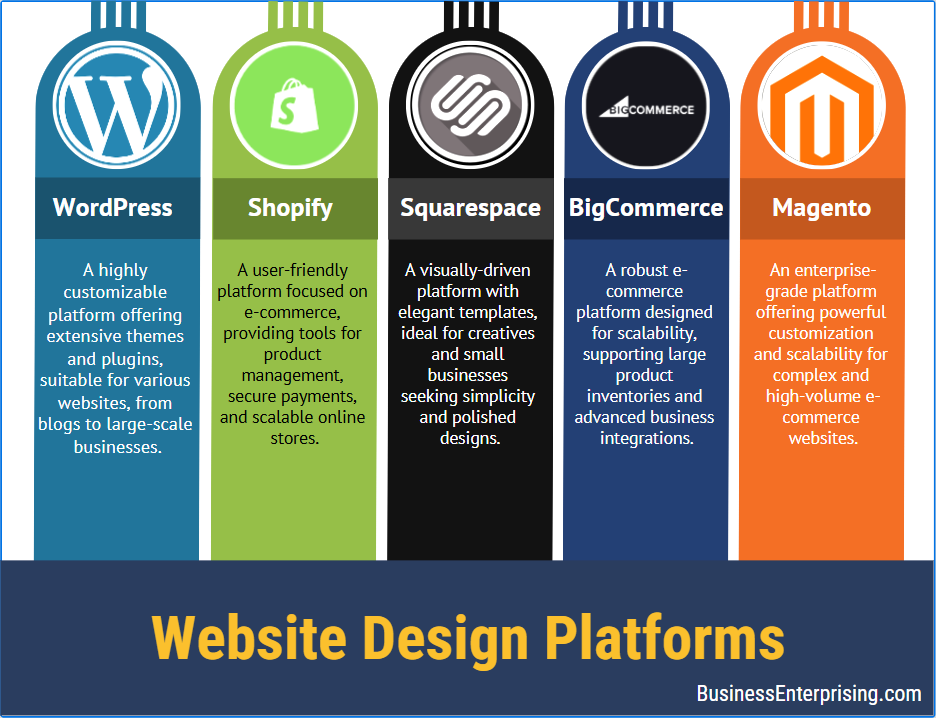 Choosing the right business website platforms is essential for creating an effective online presence. Each platform offers unique features to meet different needs. However, with so many options available, finding the best fit can feel overwhelming. By understanding their strengths, you can make an informed decision that supports your goals.
Choosing the right business website platforms is essential for creating an effective online presence. Each platform offers unique features to meet different needs. However, with so many options available, finding the best fit can feel overwhelming. By understanding their strengths, you can make an informed decision that supports your goals.
Additionally, factors like ease of use, customization, and pricing play a significant role in your choice. Some platforms prioritize simplicity, making them ideal for beginners. Others focus on advanced tools or e-commerce features for businesses with specific needs. Evaluating these options helps you select the platform that aligns with your priorities.
Your website is often the first impression customers have of your business. Choosing the right platform ensures it reflects your brand while delivering a seamless experience. By exploring the features of various business website platforms, you can create a site that grows with your business and supports long-term success.
Overview of Popular Website Platforms
Choosing the right business website platform is essential for creating a functional and appealing online presence. Popular platforms like WordPress, Wix, Shopify, and Squarespace each offer unique features tailored to different needs. Understanding their core purposes can help you determine which platform best fits your business goals.
WordPress is a highly customizable platform with extensive plugins and themes. It is ideal for businesses looking for flexibility and scalability. However, it may require some technical knowledge to maximize its potential. Wix, on the other hand, focuses on simplicity and user-friendliness. Its drag-and-drop editor is perfect for those who want to build a site without coding experience.
Shopify is a standout option for e-commerce businesses. It offers robust tools for managing inventory, payments, and shipping. Additionally, its seamless integration with third-party apps makes it a strong choice for online stores. Squarespace combines beautiful design templates with ease of use, making it suitable for creative businesses and personal brands. While it lacks the advanced features of WordPress or Shopify, it excels in simplicity and design aesthetics.
Each of these platforms offers tools to help your business grow online. By comparing features and understanding your specific needs, you can choose a platform that supports your objectives. Selecting the right business website platform is a key step in building a successful digital presence.
Customization and Design Flexibility
Customization and design flexibility are key factors when comparing business website platforms. The ability to tailor your website to match your brand can greatly impact your online presence. However, different platforms offer varying levels of design options, making it important to assess which one fits your needs.
WordPress offers extensive customization options through themes and plugins. It provides the flexibility to create a fully personalized website, but it may require some technical skills. Additionally, WordPress allows access to the underlying code, which is ideal for advanced users who want total control. On the other hand, Wix focuses on simplicity and offers a drag-and-drop editor that makes customization accessible to beginners. While it may not match WordPress in complexity, Wix provides plenty of design freedom for smaller projects.
Shopify prioritizes e-commerce functionality but also offers customization through themes and third-party integrations. However, its design options may be more limited compared to WordPress. Squarespace strikes a balance between ease of use and design quality. It features professional templates with built-in tools for customization. Although less flexible than WordPress, it caters to users who prioritize aesthetic appeal and simplicity.
By understanding the customization capabilities of each platform, you can select the one that best aligns with your branding goals. Business website platforms differ in their ability to balance ease of use and creative freedom. Choosing the right platform ensures your website reflects your brand while meeting your functional needs.
Ease of Use for Non-Developers
Ease of use is a key factor when selecting business website platforms, especially for individuals without technical expertise. Platforms that prioritize user-friendly features allow you to create a website with minimal stress. Additionally, intuitive tools make it easier to focus on your content and design rather than technical details.
Wix is one of the most user-friendly platforms available. Its drag-and-drop editor allows you to customize your website without coding. Additionally, Wix offers guided tutorials and pre-designed templates, making it ideal for beginners. Squarespace also caters to non-developers with its streamlined interface and professionally designed templates. However, while Squarespace is simple to use, its customization options are more limited compared to advanced platforms.
Shopify stands out for those who want to build an e-commerce site without technical knowledge. Its straightforward dashboard helps you manage products, inventory, and payments with ease. However, Shopify’s design features may feel restrictive if you need extensive customization. WordPress, while powerful, can be less user-friendly for beginners. Additionally, its advanced features may require some technical skills or a willingness to learn.
By choosing a platform that matches your comfort level, you can create a professional website without unnecessary frustration. Business website platforms like Wix, Squarespace, and Shopify simplify the process while delivering excellent results. Selecting a platform that prioritizes ease of use helps you focus on building your business, not troubleshooting technical issues.
E-Commerce Capabilities
E-commerce capabilities are a critical factor when choosing business website platforms, especially if you plan to sell products online. Platforms designed for e-commerce provide tools to manage product listings, payments, and shipping efficiently. Additionally, they often include features that simplify the customer experience, making online shopping seamless.
Shopify is widely recognized as one of the best platforms for online stores. It offers robust e-commerce tools, including inventory management, payment processing, and shipping integration. Additionally, Shopify’s app store allows you to expand functionality with third-party solutions. For businesses focused on e-commerce, Shopify’s simplicity and scalability make it a top choice.
WordPress, when paired with the WooCommerce plugin, also offers excellent e-commerce capabilities. This combination allows you to create a highly customizable online store. However, it may require more technical knowledge compared to Shopify. Squarespace is another platform with strong e-commerce features. It is ideal for smaller online stores that prioritize design, offering stylish templates and straightforward tools for managing products.
By selecting a platform with robust e-commerce capabilities, you set your business up for online success. Business website platforms like Shopify, WooCommerce, and Squarespace provide the tools you need to grow your online store. Choosing the right platform ensures you can manage your store efficiently while delivering a great experience for your customers.
SEO and Marketing Features
SEO and marketing features are essential when evaluating business website platforms. These tools help improve your website’s visibility and attract new visitors. Additionally, they make it easier to create and track campaigns that drive customer engagement. However, platforms differ in the level of SEO and marketing support they provide.
WordPress stands out for its robust SEO capabilities. With plugins like Yoast SEO, you can optimize content, manage meta descriptions, and improve site performance. Additionally, WordPress allows full control over your website structure, which can positively impact search rankings. Shopify also offers strong SEO features tailored to e-commerce, including customizable URLs and built-in analytics for tracking traffic.
Squarespace provides integrated marketing tools, such as email campaigns and social media integrations, making it simple for non-developers. However, its SEO capabilities are less advanced compared to WordPress. Wix is beginner-friendly, offering step-by-step SEO guides and automated features. Additionally, it includes a marketing dashboard for managing campaigns in one place.
Choosing a platform with effective SEO and marketing tools can significantly impact your online success. Business website platforms like WordPress, Shopify, and Squarespace provide options to suit different needs and expertise levels. By leveraging these features, you can enhance your visibility and connect with your audience more effectively.
Pricing and Scalability
Pricing and scalability are critical factors to consider when choosing business website platforms. The costs of maintaining a website can vary widely depending on your needs. Additionally, selecting a platform that can grow with your business ensures you can adapt to changing demands without starting over.
WordPress offers flexibility in pricing, with costs depending on hosting, themes, and plugins. This allows you to start small and expand as needed. However, managing scalability on WordPress may require technical expertise. Shopify provides straightforward pricing plans tailored to businesses of different sizes, making it ideal for e-commerce growth. Additionally, Shopify’s robust app store supports businesses as they scale operations.
Wix and Squarespace offer fixed pricing tiers that simplify budgeting for small businesses. While these platforms are easy to use, their scalability options can be limited for larger or more complex businesses. Additionally, advanced features or expanded storage may require upgrading to higher-tier plans. These upgrades can increase costs over time, so it’s important to factor them into your growth strategy.
By comparing pricing and scalability options, you can find a platform that aligns with your business goals. Business website platforms like WordPress, Shopify, Wix, and Squarespace cater to different needs and budgets. Choosing the right platform helps you manage costs effectively while supporting long-term growth.
Conclusion
Choosing the right business website platforms is an important step in building your online presence. Each platform offers unique features tailored to specific needs. However, finding the best fit requires evaluating factors like customization, scalability, and ease of use. Additionally, considering costs and growth potential helps you make an informed decision.
Platforms like WordPress, Shopify, Wix, and Squarespace provide a variety of options for businesses of all sizes. While some prioritize simplicity, others focus on advanced features or e-commerce capabilities. By aligning platform features with your business goals, you can create a site that supports your success.
Your choice of platform should balance current needs with future growth. Selecting the right option ensures your website remains functional and effective as your business evolves. By comparing business website platforms carefully, you can build a strong foundation for your digital presence and long-term success.



